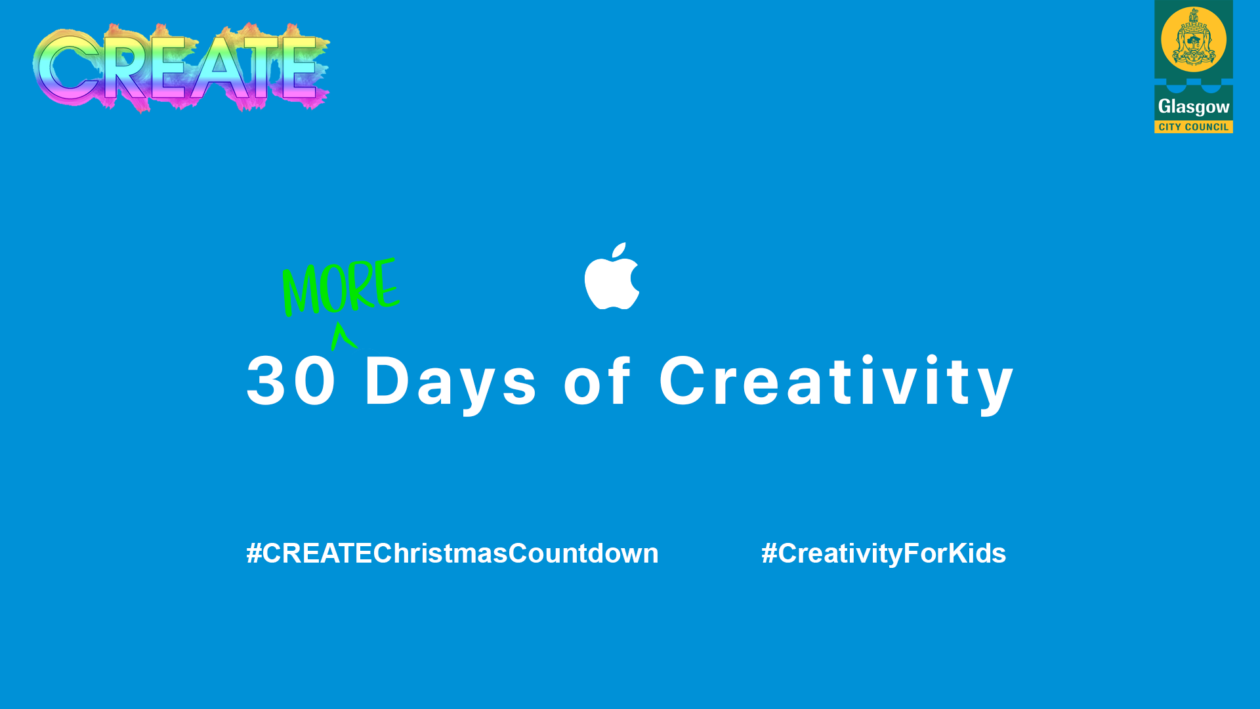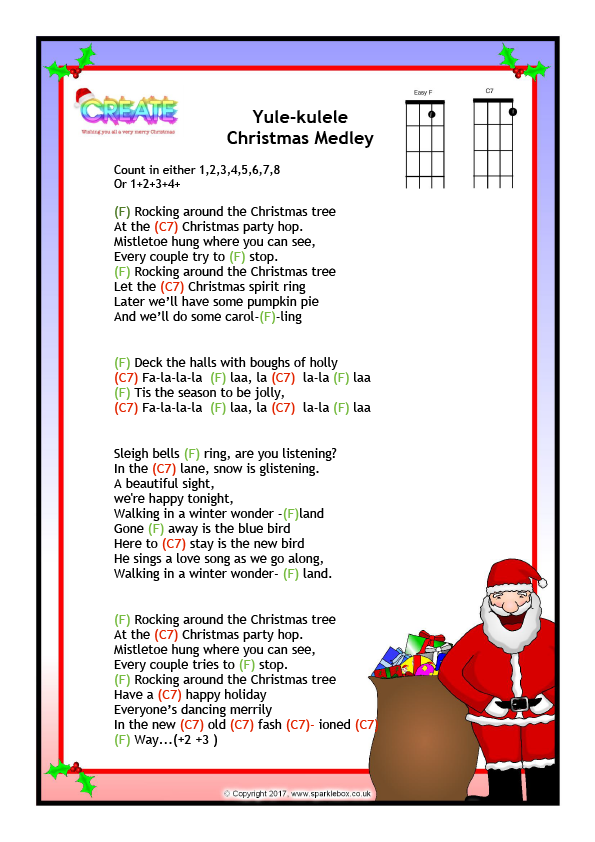Glasgow CREATE Music Service
October 2020
Glasgow CREATE Lockdown Report
Glasgow CREATE adapted to establish online platforms to communicate effectively with parents and families and continue to engage children and young people in expressive arts and creative learning. The new platforms include a CREATE website, YouTube and Facebook, and Blogs for the Instrumental Music and Youth Music Initiative Services. As well as offering access to lesson materials and demonstration videos, these platforms were used to run campaigns to inspire and motivate learners to engage in activities which promote positivity and creativity during a very difficult period. The ‘30 Days of Creativity’ campaign provided daily creative challenges for children to complete using digital tools. The ‘Love from Glasgow’ composing competition invited children and young people to write a piece of music as a message of positivity to family, friends, or the community. Continuing to promote a culture of positivity, Secondary pupils were asked to create a YouTube style video sharing what they love about drama and advice for upcoming S1 pupils. With the absence of end of year concerts, our digital platforms hosted a ‘Glasgow Schools Young Musician Celebration’ which gave children and young people an opportunity to showcase their talents and skills developed over the past year.
Who did it involve, including partners or other community organisations?
Glasgow Education Services’ ‘CREATE’ (Creativity and Expressive Arts Transforming Education), which includes the Instrumental Music Service and Youth Music Initiative programme, Teachers, Music Instructors, children and young people from across Glasgow Primary and Secondary schools. Partnerships with Apple, Glasgow’s Digital Learning programme, Haydock Music, Glasgow Times and the Benedetti Foundation.
What difference did this make?
Children and young people were able to access high quality and engaging learning experiences at home via the online platforms. Families without internet accessed home learning ideas for Music, Drama and creativity via Glasgow Times articles and packs sent to Hub schools. Teachers were able to access materials to support expressive arts and creative learning, which were shared via school digital learning platforms and used to engage children in Hub schools.
The use of digital tools has enabled children and young people to continue to receive instrumental tuition and access individualised lesson materials and regular feedback from instructors. With over 60 participants, virtual concerts allowed young people to celebrate their successes.
The daily videos for 30 Days of Creativity, shared via YouTube, Twitter and Facebook, received high levels of engagement with 27.8K views and 244 subscribers on Youtube; on Twitter, we had 572.3K impressions, 3.9K link clicks and 1.2K retweets, with creative responses to the challenges shared by children and Teachers across the city. The ‘Love from Glasgow’ competition engaged Primary and Secondary pupils from across the city in song writing and composition with the winning entries receiving prize vouchers from Haydock Music in celebration of their creativity.
How has this changed CREATE’s outlook, practice, work and how might this have an impact long term?
Over the past 6 months, there has been a complete re-think about how music and instrumental lessons are delivered. Demonstrating commitment and creativity, all 80 instructors adapted their practice and enhanced their skills using digital technology to deliver lessons via Teams during lockdown and continue to provide individualised support for young people through blended learning. The use of digital tools to facilitate team meetings will have an impact long term, having increased communication and collaboration between members of a large peripatetic team and enabled further opportunities for sharing practice.
Due to the success of the 30 Days of Creativity project and partnership with Apple, this approach will be implemented in the future to continue to promote creativity and digital innovation across the curriculum.
CREATE is committed to developing a comprehensive online resource which will have an impact in the short and long term on the support available for teachers to deliver the expressive arts curriculum. A progression framework, resources, videos and live stream lessons will widen the reach of the service, providing regular high-quality learning experiences. This equitable approach will ensure all children and young people access a progressive expressive arts programme, which is sustainable moving forwards.
During lockdown almost all children were deprived of the daily social interactions provided by the school environment, and therefore unable to create and develop bonds with peers and teachers, which resulted in some children being disengaged with school and learning.
Listening and music appreciation has proven to be an invaluable and therapeutic resource, adding benefits that extend beyond acquisition of music skills.
In listening to music, children are developing the ability to evoke and share powerful emotional responses and experiences. This has provided an opportunity for them express how they were and are feeling, and to vent potentially difficult thoughts or emotions. With each piece of music being different there are limitless opportunities to explore, and this helped children improve their communication skills, reduce stress and anxiety, express themselves and promote well-being.
Social-emotional competencies and well-being have a significant impact on how pupils both enjoy school and learn, listening activities enhance this greatly, as well as developing perceptual, language and literacy skills. This will continue to be a focus for YMI Music moving forward as part of the Music Skills Progression Framework.
Glasgow CREATE’s plans moving forward
CREATE Music Service remains committed to ensuring the safe delivery of music lessons and tuition ensuring the provision of high-quality learning, teaching and skills progression for children and young people whilst following Scottish Government and Glasgow City Council Education Department Guidance in terms of COVID19.
All establishments are adhering to CREATE Additional Guidance for Schools which includes guidance for Health and Safety and is subject to change and revision.
The Scottish Government Sub Group on Coronavirus (COVID-19) Education and Children’s Issues provided an advisory note on PE, Music and Drama in Schools on 10th September 2020. The advice is current on this date. The advice is reviewed periodically and may change as evidence is published and more about the virus is understood.
https://www.gov.scot/publications/coronavirus-covid-19-advisory-sub-group-on-education-and-childrens-issues-advice-on-physical-education-music-and-drama-in-schools/
Glasgow CREATE have based all Music Service decisions on this guidance.
CREATE Bands, Orchestras, Ensembles and Choirs
There are approximately 500 children and young people from Primary and Secondary Schools across Glasgow who take part in CREATE City Groups based in City Halls.
In accordance with National Guidance and to ensure the Health and Safety of all involved, it is unlikely that large scale group music activities will be possible for the foreseeable future. Therefore, all CREATE Bands, Orchestras, Ensembles and Choirs have been suspended at present. This will continue to be reviewed and advice will be updated accordingly.
However, CREATE Guidance is clear that where Health and Safety Guidance allows, schools may encourage children and young people to explore smaller group performances with strict social distancing considering the different instrument groups and us of online platforms to make music together may also be a possibility.
At present, Scottish Government Advice states;
Music/singing
- Scientific and medical advice around how activities such as singing, talking at volume e.g. in theatre performance, or playing wind/brass musical instruments can be managed safely is still being developed. These activities should be avoided during the initial return to schools.
Therefore, the decision has been taken that at present under no circumstances should the use of Voice, Pipes, Woodwind and Brass take place in schools until Government Guidance is updated.
Instrumental Music Service (IMS)
Each Instrumental Music Instructor (IMI) has been allocated a base school. Base schools have been allocated centrally and are reviewed on an ongoing basis. All Faculty Heads and Principal Teachers have been informed of this allocation.
Tutors will visit up to five schools in one week where there must be a suitably ventilated room available. However, tutors should not visit more than one school per day.
26 out of 30 Secondary Schools responded to a recent survey indicating that they were satisfied that the Instrumental Music Timetables are working well. 20 schools have reported that IMI rotations are also working well in their school.
There are a variety of rotations for face to face lessons in schools. However, on the alternate weeks where a young person is not receiving a face to face lesson, they are having contact through Showbie Pro or Teams to ensure learning is progressed.
All voice, woodwind, brass and pipes tuition is presently being completed remotely.
At presents tutor rotations are as follows;
Weekly Tuition 31
Two Weekly 37
Three Weekly 10
Video Lessons
Despite restrictions, CREATE has ensured continuation of high-quality tuition with all Woodwind, Brass, Pipes and Voice lessons being delivered via Showbie Pro or Microsoft Teams.
At present 13 schools are reporting that remote lessons are being facilitated in school and 13 are reporting that young people are accessing these from home. Tutors are adapting their hours to support children and young people and progress learning.
Most schools are reporting that they have good systems in place to liaise with Instrumental Music Service regarding school and remote lessons and most are confident that they are gathering strong video evidence for SQA Practical Examinations.
4 schools can access Showbie Pro at present and 16 are able to access Teams for video lessons.
The majority of IMS now have access to an Ipad and almost all have access if using a personal device.
Where there has been insufficient space in a school, IMI have been able to deliver digital instrumental music lessons using Showbie Pro (or Microsoft Teams in the event of Showbie Pro being unavailable) from an alternative school or home.
Youth Music Initiative (YMI)
In Term One, Youth Music Initiative (YMI) Staff have concentrated on supporting Primary Schools with Early Literacy Skills and Phonological Awareness with a focus on Primary One and Two which was extended where time allowed. This equated to each school accessing a block of 4 weeks. At present singing is not permitted as per Scottish Government Guidance therefore there has been a focus on using rhythm, rhyme, clapping and body percussion. Quiet humming has been permitted.
Challenges and Solutions
Out of the 26 schools who responded to the survey, 12 are reporting that remote lessons are working well and 14 are experiencing difficulties with wifi, whitelisting and physical space.
White Listing issues with Showbie Pro have meant that some children and young people are unable to access video lessons both in school and at home. However, GCC Digital Lead is working with Showbie Pro on a solution to this as significant research has shown that this is by far the best platform for tuition due to its live video facility as well as the ability to upload files and provide feedback.
Almost all Instrumental Music Tutors have accessed digital and face to face training on Showbie Pro which was very successful. This will be offered to Youth Music Initiative Tutors moving forward.
Wifi in some School Music Departments is causing difficulty in accessing Showbie Pro or Teams which is limiting the ability for live music lessons. IMS Manager is identifying the schools where Wifi is the barrier and reporting to Head of Service who will address this with the appropriate personnel.
At present, the restriction in place which only allows tutors to visit two schools per week is limiting the number of children and young people who can receive weekly face to face tuition. This is being reviewed on a regular basis due to the fact that if tutors were able to visit one school per day it would allow a significant increase in the number of face to face weekly tuition with less rotations.
The most serious concern remains the restriction on teaching voice, pipes, woodwind and brass in school. Although extremely challenging, IMI Tutors in this category are continually being creative to ensure that children and young people are not put at a disadvantage. At present, children and young people are accessing tuition from home and where this is not possible tutors are using recordings to progress learning.
There is continual review of the Digital Offer by CREATE Senior Managers to ensure that the level of disadvantage to these young people is minimised as much as possible.
At present, YMI Tutors are limited in the numbers of children they can teach in a week and impact in terms of skills progression is limited.
The decision has been taken to review the YMI Service to support Senior Phase Young People who are working towards practical examinations. Where experience allows, YMI Tutors will support these young people through both face to face and digital lessons. This will also help to reduce the number of rotations.
YMI Tutors are also prioritising supporting Music Initiatives in Primary Schools such as Baby Strings.
In addition, they are working in teams to complete the Music Skills Progression Framework for Broad General Education as this will support schools to deliver a high-quality music curriculum.
YMI Tutors will remain the link for their schools and Primary Schools are identifying a CREATE Champion who they will link with for all areas of the Expressive Arts.
The CREATE Website is being launched in October 2020 and it has a teachers’ section for all Expressive Arts Frameworks in addition to information and support for young people and families.
YMI tutors will also be allocated a Year Group and will be live streaming lessons to schools to ensure all children have access to high quality music lessons on a weekly basis.
In addition, YMI Tutors are Mentoring Bachelor of Education Year One Students from Royal Conservatoire of Scotland who will assist with supporting schools to deliver the Skills Progression Framework for Music.
CREATE Initiatives 2020
To further ensure the quality of Musical Experiences for our children and young people CREATE is exploring online digital ensembles for Strings, Woodwind, Brass, Voice, Guitar, Pipes, Drums, Harp and Percussion which are leading towards a streamed Christmas Concert on 14th and 15th December which will involve all Secondary Schools. YMI Tutors are presently exploring how Primary Schools can also contribute to this City Concert. As with Glasgow CREATE tradition the concert will feature a city performance of Highland Cathedral.
Glasgow CREATE Baby Strings, in Eastbank Learning Community is back up and running supported by the Instrumental Music Service and are exploring concerts which will be streamed on digital channels.
Saint Roch’s Percussion Project, supported by Instrumental Music Service are planning their annual Percussion Festival which will be streamed online in November.
CREATE Instrumental Service is planning to work with BBCSSO on virtual masterclasses for all String Players linked to the materials being used for the Digital Ensembles which will take place early November.
An online Percussion Workshop is presently underway to replace the live workshops to ensure continuity of learning for our children and young people.
CREATE Instrumental Music Manager has worked with Trinity to ensure that Music Examinations will take place for Glasgow Children and Young People virtually.
Glasgow CREATE Big Band are planning performance online in December 2020.
YMI Tutors are constructing Ukulele Tutorial Videos and there will be video support small Samba groups in Primary Schools.
CREATE Digital Platforms
A member of the CREATE Youth Music Initiative Team has been given the remit for CREATE Digital Platforms on a fulltime basis to support the change to an online delivery to ensure creative thinking and new ways of working ensure high standards continue.
CREATE Website – www.glasgowcreate.online
Twitter – http://twitter.com/GlasgowCREATE
Facebook – http://facebook.com/GlasgowCREATE/
CREATE YouTube – www.youtube.com/c/glasgowcreate
IMS YouTube – https://www.youtube.com/channel/UCdvBpL4C-aJXj2yS9JTv7Tw
YMI Website – https://blogs.glowscotland.org.uk/gc/createymi/
IMS Website – https://blogs.glowscotland.org.uk/gc/glasgoweducationserviceims/
CREATE Teachers Resources – https://blogs.glowscotland.org.uk/gc/createresources










